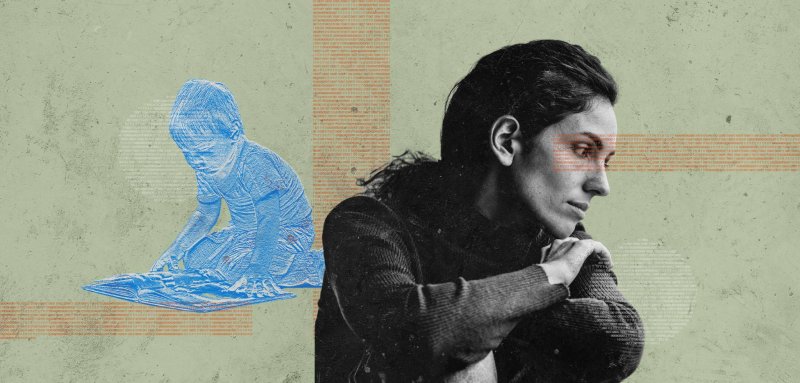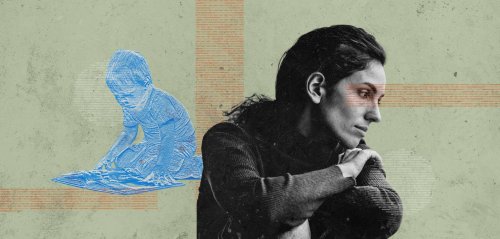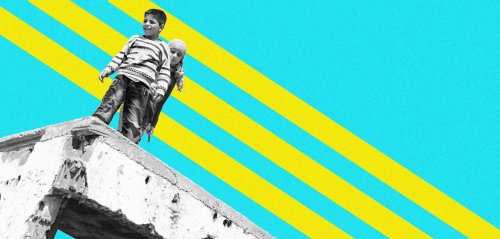"Regret motherhood? No, sir, I regret getting married in the first place," Roaa Mansour begins her story about childbearing and motherhood and how they've been affected by Syria's political, economic and societal factors during the war.
Today, Roaa, 34, is a mother of two; Ahmed is 6 years old, and Mazen is 8 years old. She says, "When I gave birth to Ahmed in 2017, the situation wasn't this bad, and there were signs of relief on the horizon, and that's what we wished for ourselves, and what political analysts on TV made fun of us for."
She adds, "But then everything suddenly changed, and for the worse, the absolute worst. We'd suddenly entered an economic grinding wheel that hasn't stopped.On the eve of giving birth to Ahmed, the dollar was equivalent to 500 Syrian pounds, and we were living fairly well, and had adapted, but today the dollar is 7,500 pounds."
Roaa does not hide her regret over having children, and at the same time spares no effort in expressing her happiness that she formed a "nice" family despite the circumstances, but she blames herself a lot for having given birth, as she believes that she had greatly wronged her children when she gave birth to them in these circumstances and in this country, she says.
"Regret motherhood? No, sir, I regret getting married in the first place. When I gave birth in 2017, the situation wasn't this bad, and there were signs of relief on the horizon.. But then everything suddenly changed, and for the worse, the absolute worst"
In the same vein, she clearly indicates that she and her husband work outside the house "day and night" to secure the expenses of the household and the two children. She confesses, "No, this is not the life I wanted for my children, one that is not less than that of their peers, but this is the country's division; some are above, and many others are below, and we as a family are swinging on the ladder of living. If I could go back in time a little, I wouldn't have given birth. In fact, the institution of marriage itself is not a good idea under these circumstances, even though I got married in a situation that required me to do so."
Again, Roaa confirms that when she gave birth to Mazen, the situation had been better (in 2015). "It is true that the war was raging at the time, but everything was available, and people were not going to sleep hungry, so it was natural to think about having children again, and I confirm that this is the last time and we will not have children in the future," she says.
"I do not want to have a child who will curse me when he grows up in this broken country"
A broken country
"What motherhood are we talking about? The one where I beg for a pack of milk formula in a country where there is no milk. This is the first and lowest need for my child and it is missing from the entire country. Why I gave birth to my child here, I really don't know. And who even knew that things would get so bad and this complicated?" Speaking to Raseef22, Mueena Hamid, 28, speaks of the regrets she lives with today.
It was natural to ask Mueena a question about the circumstances that preceded childbirth, given that her baby girl was born just months ago, and the economic situation was already dire when she became pregnant with her child. She says, "It is true that the situation was bad, but today is worse. I do not want to justify it to myself. I'm full of regret, but when we made the decision to have children, my husband was about to start a job with an excellent income, but then he quickly resigned from it, and went back to his government job, and things got worse even further. I say clearly that we did not have a lot of foresight on this, and today we are reaping the result, but in the worst way; a result on the shoulders of an innocent girl who has no fault other than that we were selfish and gave birth to her in a broken country."
Mariam, a pseudonym for a woman who just turned thirty, talks to Raseef22 about the enormous pressure she was subjected to by her husband and his family to have children, despite knowing in advance that she would not be able to secure a decent life for them.
"What motherhood are we talking about? The one where I beg for a pack of milk formula in a country where there's no milk. This is the first need for my child and it's missing from the entire country. Why I gave birth to my child here, I really don't know"
"Four years of pressuring me to give birth, and I'm refusing, and then in the end what? I succumbed to these pressures that even my own family started to inflict on me. We live in a society that doesn't accept a young woman getting a divorce, and my family will not take me in as a divorced woman if I stick to my position. So I simply gave birth, I gave birth to a son, then a second and a third, and then I asked my in-laws who would feed them? No answer. I asked my own family the same question, and there was no answer. I knew that my children and I would pay the price," says Mariam.
Mariam knew that she could not rely on her family and her husband's family to help provide for her children. She was relying on her husband's work as a building contractor, but his work would go through periods of prosperity and then severe decline.
She continues, "I raised my children through blood, sweat and tears, and with hardship and deprivation. This is our life and this is our society. We eat today and don't think about tomorrow. I regret bearing the responsibility of these children and I regret my motherhood and how my dreams of completing my studies and other things were lost. But then what? Well, now I'm a mother... And that's that."
Mariam points out that what has always overwhelmed her is how much those around her repeat the phrase: "When a child comes, his livelihood will come with him." She says in response, "Well the children came and no sustenance came with them, and tomorrow we may become beggars."
Offerings to the flames
"I will die before I give birth in this country, imagine giving birth to a son and throwing him as an offering to the never-ending flames. Imagine giving birth to a soul to die of despair in this great nation."
These were the words of Maysa Ammour, a woman who has been married for five years and has just turned twenty-eight years old, as she explains to Raseef22 at length the reasons for her reluctance to have children. She justifies her decision with a number of reasons, mainly by comparing the experiences of others around her, and her husband's understanding of the matter.
"Four years of them pressuring me, so I finally gave birth to a son, then a second and a third. I asked my in-laws who would feed them? No answer. I asked my family the same question. There was no answer. I knew that my children and I would pay the price"
She adds, "My husband and I are educated and understand the sensitivity of living in this country and how difficult everyone's livelihood is, so we decided not to have children. Until when? Until the circumstances radically change, or we emigrate from the country."
Mirna Jamal clings to the idea of not having children even after turning 31. She states, "Since I was engaged a few years ago, the man who became my husband and I have agreed not to have children until the circumstances become completely favorable, and anyone can clearly see how our living situation is getting worse day by day, so we are still committed to not having children even now. Although I do not hide my love for being a mother, I will not allow my love or body to be a means of bringing a person into the world that is doomed to hunger, need and an unknown future."
Rima Nasser, 26, takes her thoughts in another direction, saying in short, "I do not want to have a child who will curse me when he grows up in this country."
On the other side
The regrets of Sulaf al-Sheikh, 27, regarding motherhood seem to be focused more on luxury, "I used to stay up late, travel and live my life as I want, I am now shackled by my child, my whole life has changed and I have become a nanny. I rarely go out with my friends. My life has changed and I don't like it."
"I used to stay up late, travel and live my life as I want, I am now shackled by my child, my whole life has changed and I have become a nanny. I rarely go out with my friends. My life has changed and I don't like it"
There are many cases that can be observed in Syrian society when it comes to regretting having children. Any other societal situation is easy to monitor due to the severity of what has resulted from the war. Some of these examples may vary, but they are abundantly available to any who looks and can easily notice that a country like Syria has become full of despair.
Despair is not an ordinary word. People are really in despair, talking to themselves in the streets, colliding with each other in the streets, and searching for food by any means, but elsewhere the cycle of life must continue; work, love, marriage, and procreation.
All of this remains understandable and justifiable in the foundations of psychology and sociology, but the strange ones are those that Raseef22, while investigating this subject, did not come into contact with: those who have had five, six, seven or more children on the basis of family pride, support, name, lineage and a future livelihood, even though most of them today cannot afford to put food on the table, but tribal custom has always been stronger.
In the midst of these customs and traditions, it seems that the body of their country still needs someone to remove many knives that have been embedded in it, so that its lungs can breathe again, and with them, life can return to the streets, love can return to homes, and fears of the future will no longer be an abyss that can swallow a person – and his wants and dreams – whole.
Raseef22 is a not for profit entity. Our focus is on quality journalism. Every contribution to the NasRaseef membership goes directly towards journalism production. We stand independent, not accepting corporate sponsorships, sponsored content or political funding.
Support our mission to keep Raseef22 available to all readers by clicking here!
Interested in writing with us? Check our pitch process here!







